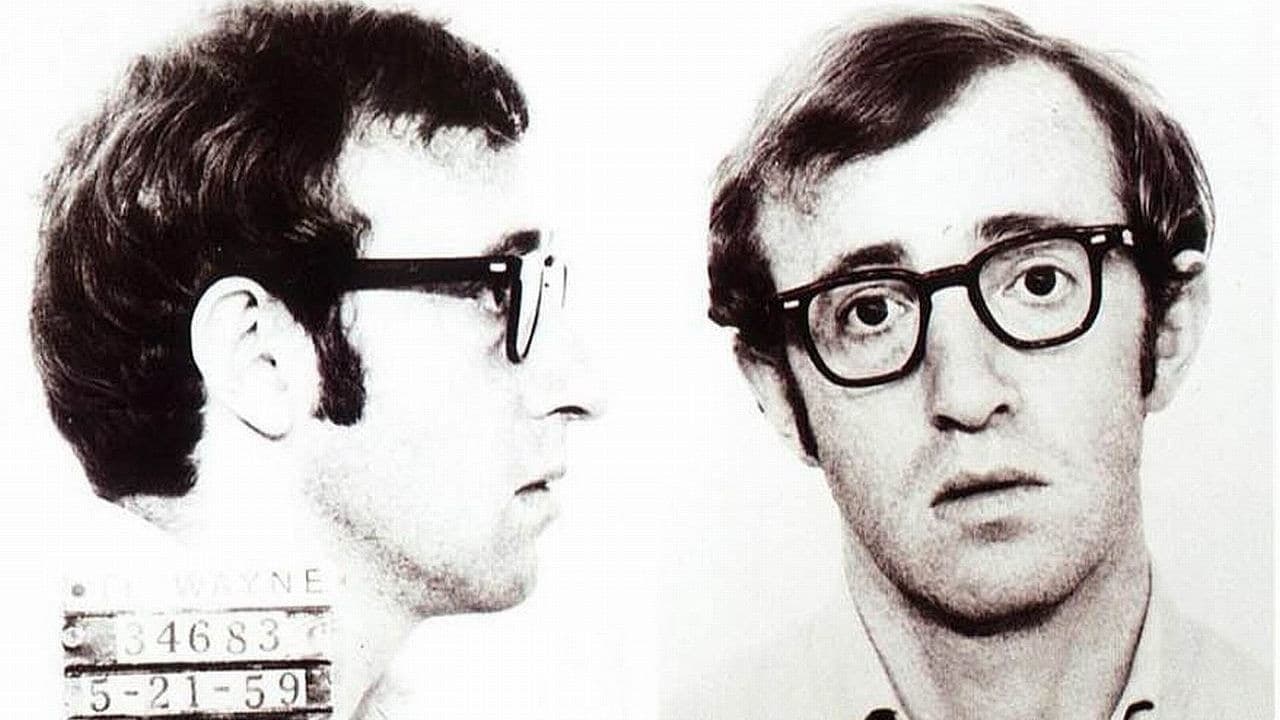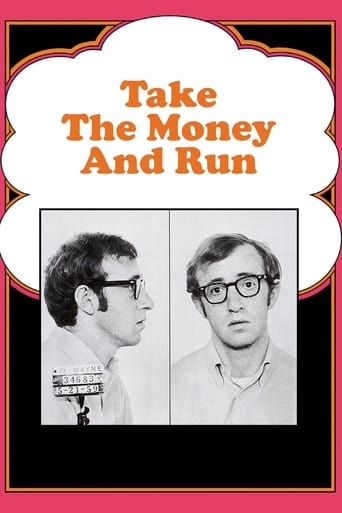Cleveronix
A different way of telling a story
Huievest
Instead, you get a movie that's enjoyable enough, but leaves you feeling like it could have been much, much more.
Ogosmith
Each character in this movie — down to the smallest one — is an individual rather than a type, prone to spontaneous changes of mood and sometimes amusing outbursts of pettiness or ill humor.
leonblackwood
Review: This movie was another attempt of humour from Woody Allen, which I found silly and not that funny. The storyline, which is based around a failed cello artist who turns to robbery after failing to be able to hold a job, seemed really over the top and the main character has to be the dumbest criminal in America. After getting caught numerous times, he ends up a regular in jail which puts a strain on his relationship with his wife. I honestly don't think that your supposed to take this movie seriously because the scenes are so far fetched and just plainly dumb. For a movie that was made in the 60's, it did make a healthy profit so the studios must have been happy, but from an audiences point of view, I just couldn't get into it. Not Funny!Round-Up: Woody Allen really had his ups and downs during the 60's because some of his movies were really crap but some were a work of art. I have definitely noticed that every one of his films have something to do with sex in them, regardless of the concept, and in this movie, which is based around a wannabe criminal, he still managed to get his leg over. Anyway, on the whole, it's not a movie that I would watch again in a hurry, but it's harmless fun if you just want some noise in the background.Budget: $1.5million Worldwide Gross: $3millionI recommend this movie to people who are into there Woody Allen movies about a failed cello player who turns to a life of crime but fails terribly. 2/10
Hitchcoc
This is neurosis personified. Woody plays a small-time thief who can do nothing right. He is thrown in prison when he screws up the note that he gives to the teller at a bank. There is a bologna stain that makes "gun" look like "gub." Now we are in for a ride as he tries to negotiate prison. At one point he carves a gun out of a bar of soap and uses shoe polish to make it look more real. Of course, he tries his prison break during a rainstorm and ends up with a hand full of suds. There are numerous scenes like this as the poor schmuck tries to lead a life of crime and fails at every juncture. Allen's great talent is that he takes routine movie clichés and creates a what if? Simply, what if this goes horribly wrong. Woody usually lands on his feet and probably owes that to the similar humor of Charlie Chaplain. This is certainly worth a look, though it is uneven, he puts forth and interesting character study.
The_Movie_Cat
The only real Woody Allen movie of the 60s, it's sometimes a wonder his impressive career ever got started with such inauspicious beginnings. After working in TV as a writer since 1950, his first break into the movies came with 1965's overdone and incredibly dated What's New Pussycat (4). Although he wrote the screenplay and had a role in it, it's not regarded as a Woody Allen film for the very valid reason that he didn't direct it. However, the fact that a great number of people tend to misremember the similarly non-Allen directed Play It Again, Sam (7) from 1972 as a Woody picture is perhaps a reflection on its relative worth.After this there followed a couple of TV movie scripts and 1966's What's Up, Tiger Lily? (5) a Japanese spy film dubbed to turn it into a comedy. Reputedly the idea of behind it was from AIP president Henry G. Saperstein, with Allen hired as gag writer and one of the voices doing the dubbing. Certainly, despite his "Associate Producer" credit, Allen didn't have a great deal of control over the picture, with an impersonator performing some extra lines as Allen and scenes of The Lovin' Spoonful crudely grafted in to extend the runtime. There are some nice one-liners in Tiger Lily ("He lives in that piece of paper?") but ultimately you'd expect something more substantial for what was, after a fashion, Allen's official directorial movie debut. Yet if nothing else, the studio interference on Tiger Lily did make Woody pledge to have greater creative control for his future works. After this we got uncredited rewrites and a role in the appalling Casino Royale (q.v.), a couple of Woody Allen TV specials and the script to the film Don't Drink The Water, a film Allen held in such low regard he remade it 25 years later. It's a messy, patchy start, and Allen wouldn't really begin to see his true potential until the 1970s.So with Take the Money and Run as, for all intents and purposes, the first "Woody Allen movie" then it's interesting to see his art originate here. It's actually quite surprising, for a film in which he unusually plays someone uneducated and working class, how many of his themes are right there at the start. We get psychotherapy, atheism, relationship comedy... there's even the first signs of someone being forced to kill to protect their own lifestyle. That's not to say that Take the Money and Run gave us Crimes and Misdemeanors (and two partial remakes in the late 2000s) but that the seed of the idea was there from the start of his career. There's also the mock documentary format, reused again in his work, most famously of course in 1983's Zelig. Although taken for granted today, this was still a relatively groundbreaking format for the time.Comedy is subjective, but there are parts where Take the Money and Run may be too broad and self-consciously "kooky" today, as with all of his 60s work. If you enjoy jokes like being "in illegal possession of a wart" or a man being turned into a rabbi by taking experimental drugs then it could be for you. But often the jokes are subtler, more inventive and wittier, and sometimes the two forms collide. Witness the scene where Allen, at a job interview, is asked what kind of office he used to work in. "Rectangular" comes the reply, an amusing adjoinder that works in the incongruous surroundings. Except, as the vignette goes on, we find he's playing a game of "What's My Line?" with a fellow colleague, and so the initial gag has been rendered meaningless. This happens repeatedly throughout, some pseudo-realistic moments rendered inert by the fantasy trappings. The one time it actually happens in reverse is when Allen is surreally holding a man at gunpoint while having a polite conversation with him... only for it to emerge that the man is a policeman who is allowing him to think he's getting away with it.However, there are also lots of genuinely inventive sequences in this film, co-written with Mickey Rose (who also co-wrote Tiger Lily and 1971's Bananas). A scene with a gun made out of soap caught in the rain, a cellist in a marching band, a domestic chain gang and a scene with an illegible hold up note are all inspired, even if the latter goes on a little too long. Adding to this is the ending, which contains arguably the most perfect punchline in any Woody Allen picture. Credit to this is given to editor Ralph Rosenblum, who convinced Allen to scrap the downbeat ending where the lead character died in a hail of bullets.In all, watching these first forays into cinema is an interesting education into the work of Woody Allen. It's a world away from the likes of Another Woman, and shows just how varied his career was, before he began to stagnate in the 90s. The Woody Allen of today still produces watchable films, but the works of a man in his 70s with a long career behind him naturally lack the zest and hunger of a writer in his 30s who was just starting out. They're also a telling reminder that the oft-misquoted "early, funny ones" were really just a very small part of his output and far from representative of the body of his work.
rustyalex2
My first impression was that I couldn't believe that this was made in 1969. Having seen Annie Hall and not knowing this was made before had really surprised me. Woody Allen comes clean and gives us a fresh comedy, which now days, speaking 21st century makes something like Date Movie seem like it doesn't exist at all. TTMAR, stars Woody Allen as Virgil, a man with no hopes and hardly any positive life experiences, from his early days such as the scene where the bullies step on his glasses to the later days when in he is in court and ironically the judge steps on his glasses, Virgil simply has no luck in life. This movie is just taking the p iss, every situation from robbing banks, to escaping the prison, to lying to his girlfriend and later wife is just hilarious. TTMAR is an example of the pure comedy genius he is. It's a relaxer a mood uplifter and literally makes you feel better about yourself, because I don't think anybody could be as unlucky as him. Heads up to Janet Margolin, she shone with innocence and her beauty posed as a juxtaposition between the two characters.

